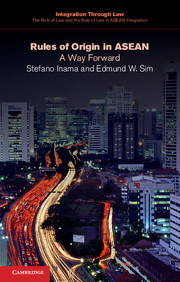Book contents
- Frontmatter
- Contents
- List of Tables
- General Editors’ preface
- Preface
- List of Abbreviations
- Chapter 1 Introduction
- Chapter 2 The initial set of ASEAN rules of origin: the lack of clarity and transparency masquerading as simplicity 1992–1995
- Chapter 3 Externalizing the confusion: the proliferation of rules in the ASEAN FTAs with dialogue partners
- Chapter 4 The silent cost: the cumbersome administration of ASEAN rules of origin
- Chapter 5 The possible way forward: self-certification
- Chapter 6 Conclusion and recommendations
- Executive Summary
- Appendices
- Bibliography
- Index
- References
Chapter 4 - The silent cost: the cumbersome administration of ASEAN rules of origin
Published online by Cambridge University Press: 05 March 2015
- Frontmatter
- Contents
- List of Tables
- General Editors’ preface
- Preface
- List of Abbreviations
- Chapter 1 Introduction
- Chapter 2 The initial set of ASEAN rules of origin: the lack of clarity and transparency masquerading as simplicity 1992–1995
- Chapter 3 Externalizing the confusion: the proliferation of rules in the ASEAN FTAs with dialogue partners
- Chapter 4 The silent cost: the cumbersome administration of ASEAN rules of origin
- Chapter 5 The possible way forward: self-certification
- Chapter 6 Conclusion and recommendations
- Executive Summary
- Appendices
- Bibliography
- Index
- References
Summary
Form D over SUBSTANCE
The “Form D” CO is the documentary foundation of the ATIGA and AFTA. Companies wishing to claim the zero tariff rate applicable under the ATIGA must demonstrate that their goods qualify as ASEAN origin either by achieving 40 percent value added from ASEAN inputs and processing, or by a CTC at the four-digit harmonized tariff system level through processing in ASEAN (there are some special product-specific rules for automotive, steel, chemical and other products as discussed earlier).
The Form D is issued – on application by the exporter – by designated authorities in ASEAN Member States on the basis of pre-export examination of the goods in question and submission of relevant documents by the exporter for each and every export consignment. The procedure includes pre-export examination of the relevant records (including sourcing and cost accounting) and – where relevant – production processes. A 2009 ERIA paper reviewed the relevant processes in two ASEAN Member States and concluded that compliance with the rules can be “costly and administratively burdensome.” However, the situation differs from country to country between full manual and personal treatment to a high degree of computerization.
The Form D process would probably score relatively high on reliability, but much less highly (and in some cases quite poorly) on simplicity and cost effectiveness, for both ASEAN Member States and exporters. This could be a major contributing factor to the severe underutilization of the ATIGA duty preferences.
- Type
- Chapter
- Information
- Rules of Origin in ASEANA Way Forward, pp. 57 - 75Publisher: Cambridge University PressPrint publication year: 2015

